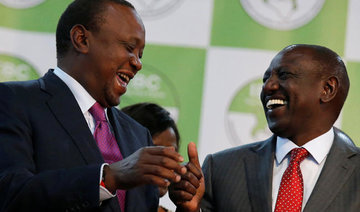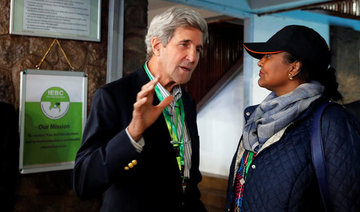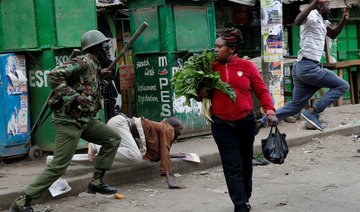NAIROBI, KENYA:Three people, including a child, have been shot dead in Kenya in opposition protests which raged overnight into Saturday after the hotly disputed election victory of President Uhuru Kenyatta.
Demonstrations and running battles with police broke out in Nairobi slums after anger in opposition strongholds against an election that losing candidate Raila Odinga claims was massively rigged.
An AFP photographer saw the body of a nine-year-old boy whose family said he had been shot in the back while watching the protests from a fourth floor balcony in Mathare, a slum in the capital.
The violence is a reminder of the bloodshed that followed a disputed 2007 election which led to two months of ethno-political violence that left 1,100 dead and 600,000 displaced.
Attention is now focused on Odinga and his first reaction to Friday’s official election results. He previously said the loss was a result of massive rigging of Tuesday’s polls, which his party denounced as a “charade” and a “disaster.”
Protests erupted in Odinga’s strongholds in western Kisumu county and poor areas of Nairobi almost immediately after the election results were declared Friday, with gunshots ringing out and fires in the streets.
“We have one person killed and four others admitted in hospital with gunshot injuries,” said Dr. Ojwang Lusi, the regional health chief in western Kisumu county.
“My brother was shot and yet he was just standing outside our house where people were demonstrating now he has a bullet injury on the hip,” said Truphena Achieng, at a Kisumu hospital.
In the southwestern town of Siaya, a police officer speaking on condition of anonymity said a man had been shot dead in a demonstration, but “we have not managed to collect the body... because of resistance from protesters.”
The charity Doctor Without Borders (MSF) on its Twitter feed said that 19 people had been wounded in Mathare.
Human Rights Watch on Saturday urged police to show restraint.
“With growing reports of demonstrations and heavy gunfire in some areas, it is important for security forces to work to deescalate — not escalate — the violence,” said Otsieno Namwaya, Africa researcher at HRW.
“The police should not use tear gas or live ammunition simply because they consider a gathering unlawful.”
Odinga, 72, is a veteran opposition politician seen as having taken his last shot at the presidency, which he has sought four times. He believes elections in 2007, 2013 and now 2017 were snatched away from him.
Politics in Kenya is largely divided along tribal lines, and the winner-takes-all nature of elections has long stoked communal tensions.
Odinga’s ethnic Luo supporters — and their allies from other groups — believe they have been denied political power by elites from the Kikuyus, the same ethnic group as Kenyatta, the country’s biggest community.
“President Kenyatta, unlike his first term, must include everyone in his government,” wrote the Daily Nation in an editorial, warning that limiting power to his tribal allies was “exacerbating exclusion and creating resentment and disillusionment.”
Amid the anxiety over how the situation would unfold, there was also much joy in Kenyatta’s strongholds after he was declared the victor with 54.27 percent to Odinga’s 44.74.
In his acceptance speech Kenyatta urged Odinga and his supporters, to “work together... so that we can build this nation together.”
“Let us be peaceful... We have seen the results of political violence. And I am certain that there is no single Kenyan who would wish for us to go back to this.”
The latest deaths mean nine people have been killed in election-related violence since Tuesday.
Foreign observers praised a peaceful, credible voting process — which saw turnout of 78 percent — but the mood quickly turned sour when Odinga rejected the results after only a few hours of counting earlier this week.
The main opposition coalition, the National Super Alliance (NASA), has claimed both that the outcome was manipulated by a massive hacking attack, and that it is in possession of results being concealed on IEBC servers that show Odinga to be the rightful winner.
On Thursday it demanded Odinga be declared president.
In 2013 Odinga took his grievances to court and lost.
“We have been there before. Court is not an alternative,” said top NASA official James Orengo.
In his first term, Kenyatta, 55, was credited with a massive infrastructure drive, however his new government will face the rising debt as a result, and a predicted slowdown in growth from an average of more than five percent in recent years.
A major issue on the campaign trail was a spike in food prices and shortage of the staple maize meal due to a prolonged drought, which has hit the country’s poorest hardest.
Kenyatta’s administration has been dogged by several graft scandals, with the country dropping six points in Transparency International’s corruption index in 2016.
Three killed in protests against disputed Kenya vote
Three killed in protests against disputed Kenya vote

8 in 10 British Muslims face ‘financial faith penalty’ when seeking home finance, survey finds

- Restricted choices plague potential buyers
LONDON: Eight in 10 British Muslims say their home finance choices are restricted because of their faith, according to a new national survey that highlighted what researchers describe as a growing “financial faith penalty” in the UK housing market.
The report, published by Islamic home finance fintech firm Offa, found that 80 percent of Muslim respondents believe their religious beliefs limit their access to suitable home finance, while those who do use Islamic products often face slower decisions, heavier paperwork and poorer customer experiences than in the conventional mortgage market.
Based on surveys of 1,000 British Muslims conducted by Muslim Census, and 2,000 non-Muslims carried out by OnePoll, the research calls on providers, brokers and policymakers to modernize Islamic home finance and improve access to Sharia-compliant products.
Among the 24.3 percent of British Muslims who have used Islamic home finance, just 5 percent said they had received a same-day decision.
Some 62 percent waited up to two weeks, while 33 percent waited more than 15 days, including 16 percent who waited over a month.
Long decision times were cited as the biggest challenge by 28 percent of respondents, followed by excessive paperwork (22.6 percent) and poor customer service (18.9 percent).
Islamic home finance differs from conventional mortgages by avoiding interest and steering investment away from sectors considered harmful to society, including gambling, alcohol, tobacco, arms trading and animal testing.
Sagheer Malik, chief commercial officer and managing director of home finance at Offa, said the findings showed British Muslims were being underserved by outdated systems.
Malik said: “Property is the asset class of choice for many of the UK’s 3.87 million Muslims, both as a route to generational wealth and as a long-term financial foundation, yet our insightful research report reveals that British Muslims are being underserved and deterred by slow, outdated and opaque Islamic home finance provision.
“This is not a niche concern. It goes to the heart of financial fairness and inclusion in modern Britain.”
He added that Muslims deserved Sharia-compliant products that matched mainstream standards on “price, speed and simplicity.”
Despite strong demand, uptake remains low.
Only 12.8 percent of British Muslims surveyed said they currently use Islamic home finance, with a further 11.5 percent having done so in the past. More than three quarters (75.7 percent) have never used it.
Faith plays a central role in financial decisions, with 94.2 percent saying it is important that their financial products align with their ethical or religious beliefs. Yet more than half of those using conventional mortgages said they felt unhappy or uneasy about doing so because of their faith.
The study also found that British Muslims share similar home ownership aspirations to the wider population, with 79.1 percent citing the desire to provide a stable home for their family, while 18.6 percent said building generational wealth was their main motivation. Only 2.2 percent said they did not want to own a home.
The report suggests Islamic finance could appeal beyond Muslim communities. While 64 percent of non-Muslim respondents had never heard of Islamic home finance, 63 percent said they favored its ethical principles once explained.
Younger generations were the most receptive, with 43 percent of Generation Z and 37 percent of millennials saying they would consider using Islamic home finance, compared with just 7 percent of baby boomers. More than three quarters of Gen Z and 72 percent of millennials also said it was important that their finance provider avoided investing in ethically harmful sectors.
Offa said the findings pointed to an opportunity to expand ethical finance in the UK, provided the industry can deliver faster, simpler and more transparent services.















